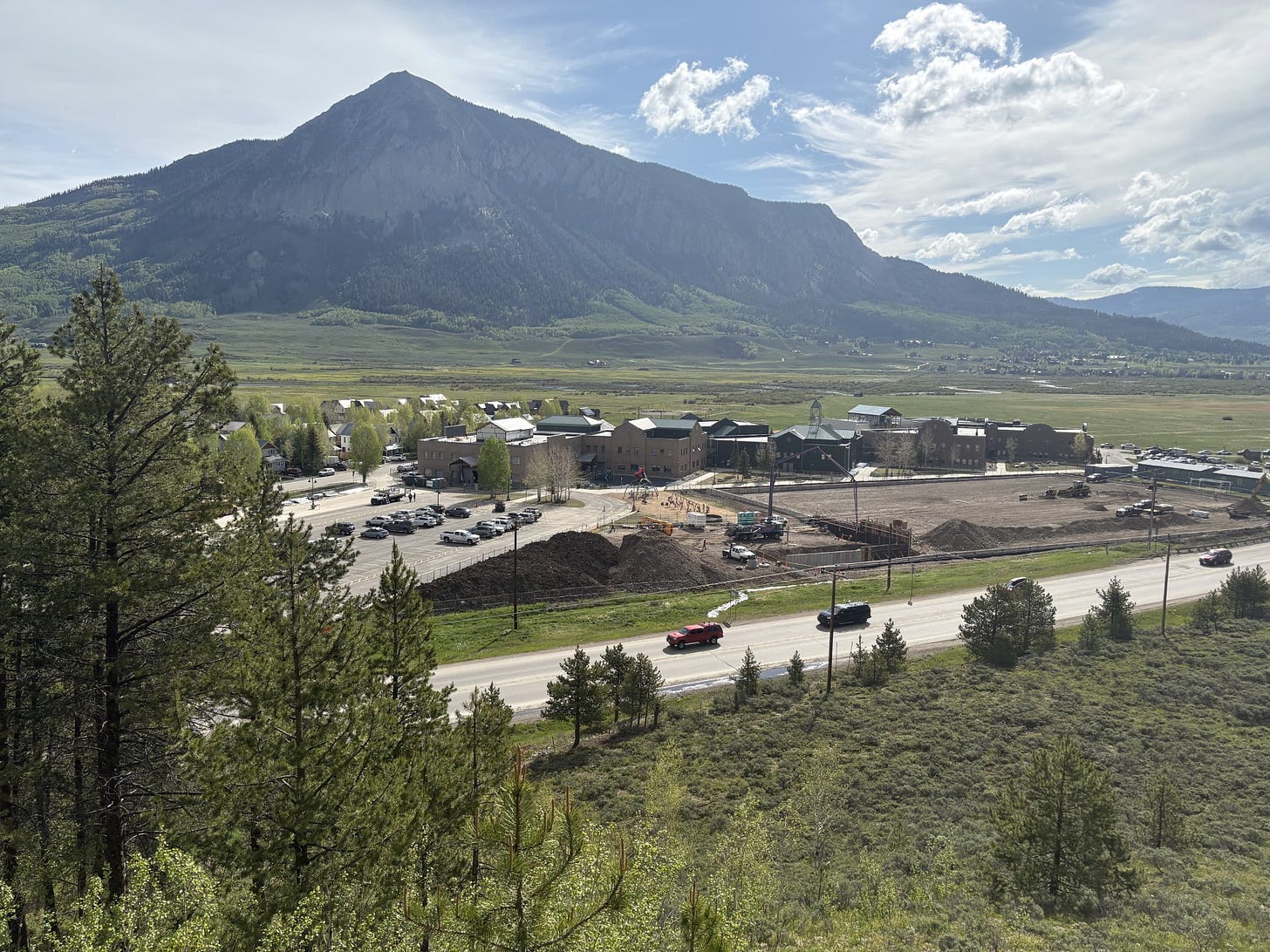Poins: Jack [or Sir John Falstaff], how agrees the devil and thee about thy soul that thou soldest him on Good Friday last for a cup of Madeira and a cold capon’s leg?
Prince Henry: Sir John stands to his word. The devil shall have his bargain, for he was never yet a breaker of proverbs. He will give the devil his due.
Poins: [To Falstaff/Jack] Then art thou damned for keeping thy word with the devil.
Part 1 Henry IV, Act 1 Scene 2, William Shakespeare, 1598
What price did the Town of Crested Butte pay when it traded mining for tourism (see my 1st substack, Victory)? Did Crested Butte sell its soul, turning into a buffoonish, Falstaffian figure fat on tourism? Or did we render a more subtle price? Ask 100 locals and you’ll (reasonably) get 200 opinions.
I’ve been pondering our souls as the Town Council considers increasing property taxes; in 7 years the cost of repaving a street block has increased from $30,000 to $150,000. Do we prefer lower taxes or damaged struts? Do we tax struggling residents to pay for wealthy visitors, falling into an “amenities trap” that prices out community members?
Skiing and wildflowers brought new residents along with tourists, creating an “amenities economy”. In 2009 my uphill skiing buddy Bill Ronai was profiled for running a NY business from Crested Butte. Covid, with zoom-enabled remote work, supercharged the ability of some to live surrounded by nature while participating in the global economy. A ski resort, amazing trails, and a nationally ranked school brought so many new residents that dogs no longer sleep on Elk Avenue during shoulder seasons.
While amenities are wonderful, not everyone can afford entry. Housing prices have jumped beyond the reach of ordinary workers. With a wealthier population we have voted for generous property tax increases for the school, fire, and recreation districts. Businesses increasingly cater to the wealthy, inflating the cost of basic goods, such as groceries and paving roads.

Problems proliferate. Locals have been selling. While many look with envy at the values of homes owned by long-time locals, envy doesn’t pay property taxes. Cashing in your home means losing your community and dark neighborhoods for those that stay. Ranching and wildlife suffer as trails and people proliferate in the backcountry even as bathrooms and trash management fall behind.
In 2023 Headwaters Economics suggested strategies to avoid being loved to death. In an amenities economy where demand from the wealthy always outstrips the budgets of local workers, they emphasize affordable housing. They also recommend shifting the costs of tourism onto tourists. For example, we can shift road costs from property taxes, paid solely by locals and businesses, to sales tax, which is shared by visitors and residents.
How to keep Crested Butte affordable and authentic?
With many deed-restricted homes coming available soon (see my substack The Gospel of Abundance), we need to prepare for future housing projects, acquiring land approved for high density housing and served by adequate infrastructure. We can incentivize the creation of deed restricted granny units on multi-million dollar lots with larger homes and flexible restrictions.
We should prioritize taxes for core services. For example, building a north valley pool with an existing pool only 35 minutes away shouldn’t be a tax priority when we struggle to fund our roads.
When we do create amenities and services, we should control costs by avoiding overbuilding. Connecting Whetstone affordable housing to our water system spreads needed facility upgrades across more users, reducing bills. But without care, residents could have seen their bills increase.
Taxes for amenities should prioritize outdoor recreation, which is less expensive and what attracts new residents. Indoor amenities funded by taxes should be simple, flexible, and reduce the challenges of winters that can stretch from October to June.
When we do levy taxes, we should reduce the financial burden on residents. In a companion Crested Butte News letter on June 19 (you have to get a hard copy or have a subscription to see it online) I suggest using sales tax for some of our road costs rather than loading costs solely on property taxes.
To jump back 400 years, William Shakespeare’s plays are magical in part because of his ability to capture simultaneous and conflicting truths. He provides the audience a narrative they can follow without giving up the complexity, and subtlety of life. Sir John Falstaff, who Shakespeare uniquely turned to for three plays, is memorable because he is many things, paradoxically a wise man and a fool, a coward and a truth-speaker, and a loyal but not necessarily healthy, friend.
For Crested Butte to be magical, we must live in the contradiction. We must be a community that works for the wanderers, the quirky, and average-day folk even as our authenticity and beauty attract wealth. We must “sell” our natural resources without “selling out”, ensuring that the animals and wildflowers are not characters in a Potemkin village, but meaningful co-residents here for the long term. We must embrace the journey, striving for utopia despite knowing we will never arrive.
As we lament what we have lost, and how we have sold our soul to remain, we must cherish what we have and embrace the future to come.






Great insight Ian; I had no idea that these issues existed, but I suspected. I wonder how many other mountain towns have similar problems. In short, it would be nice to navigate a future where CB does not become Aspen.